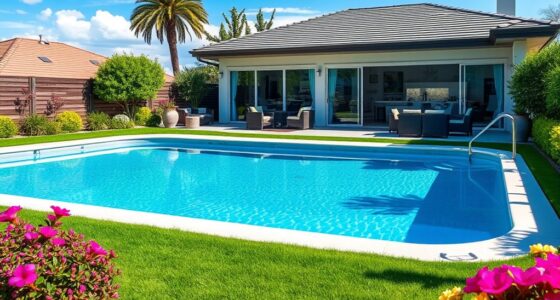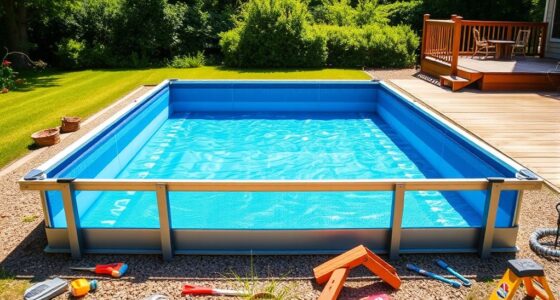When applying for a pool permit, you need to make certain your plans meet local zoning laws, setback requirements, and safety standards. Zoning rules dictate where and how big your pool can be, while setbacks require you to keep a safe distance from property lines and structures. If your plans don’t comply, you might need to request a variance. Keep in mind, understanding these requirements helps you avoid costly violations—learn more about how to navigate them confidently.
Key Takeaways
- Obtaining planning permits ensures pools meet local zoning regulations and safety standards before installation.
- Zoning laws specify pool size, location, and setbacks from property lines and structures.
- Setback requirements define minimum distances; variances can be requested for deviations.
- Safety barriers and equipment placement are mandated to protect swimmers and neighbors.
- Permit approval involves submitting detailed plans showing compliance with setbacks, barriers, and other standards.

Adding a pool to your property is an exciting project, but before you plunge in, you need to understand the planning permit requirements. These rules are vital because they ensure your pool complies with local regulations related to zoning, setbacks, and variances. One of the first things you’ll need to consider is how your pool fits within your property boundaries. Zoning laws often dictate the size, location, and purpose of pools in different areas. For example, some zones might restrict the height of any structures or require setbacks from property lines, streets, or other buildings. Knowing these restrictions helps you plan your pool’s placement effectively, avoiding costly redesigns later. Ensuring proper storage of pool equipment** can also be an important factor in complying with safety and maintenance standards. Another important factor is the placement of safety barriers. Most jurisdictions mandate safety barriers around pools to prevent accidents, especially involving children. These barriers can be fences, walls, or gates that are a specific height and have self-closing, self-latching mechanisms. Installing safety barriers isn’t just about compliance—it’s about protecting your loved ones. When planning your pool, you should also think about the location of pool equipment. Proper placement of filters, pumps, and heaters is essential for safe operation and maintenance. Typically, pool equipment should be positioned in accessible yet unobtrusive areas, away from neighbor’s view or public spaces, to keep your yard neat and safe. Getting a planning permit often involves submitting detailed plans that include the pool’s location relative to property lines, existing structures, and any proposed safety barriers. If your desired pool doesn’t meet setback requirements, you might need to apply for a variance. Variances are special permissions that allow you to deviate from standard zoning rules, but they usually require a formal application and justification process**. This might involve demonstrating that your pool’s placement won’t negatively impact neighbors or the community.
Frequently Asked Questions
How Long Does It Typically Take to Get Pool Permits Approved?
Permit processing for pool approvals usually takes about 2 to 8 weeks, depending on your local jurisdiction and the complexity of your project. You can expect approval timelines to be quicker if all your documentation is complete and meets zoning and setback requirements. To avoid delays, make certain you submit accurate plans and follow up regularly with the permitting office. Being proactive helps speed up the approval process and gets you pool-ready sooner.
Are There Different Permit Requirements for Above-Ground vs. In-Ground Pools?
Yes, permit requirements differ for above-ground and in-ground pools. For above-ground pools, you generally need fewer permits, mainly focusing on pool size and safety barriers. In contrast, in-ground pools require detailed permits based on pool size, construction materials, and location within your property. You’ll need to provide plans that specify the construction materials used and the pool’s dimensions to guarantee compliance with local codes.
Can I Build a Pool Without a Permit in My Area?
Is building a pool like planting a seed without checking the soil? You likely can’t skip permits, as local regulations usually require one for safety and compliance. Permit exemptions are rare and limited, so it’s best to contact your local building department first. Skipping permits can lead to fines, delays, or needing to tear down your pool later. Always verify your area’s rules before starting construction.
What Are Common Reasons Permit Applications for Pools Are Denied?
Your pool permit application might get denied if you have zoning violations, such as building too close to property lines or in restricted areas. Additionally, submitting incomplete applications that lack necessary details or documents can lead to rejection. To avoid this, double-check zoning rules and make sure your application is thorough and accurate. Addressing these issues proactively helps increase your chances of getting approval smoothly.
Do Permits Cover Only Construction or Also Safety Inspections?
Permits typically cover both construction and safety inspections. When you apply, the permit scope guarantees your pool meets local building codes and safety standards. Once construction is complete, inspectors will evaluate your pool for safety compliance, checking fencing, covers, and electrical systems. This process helps protect you and others, ensuring your pool is safe to use and meets all legal requirements before you start swimming.
Conclusion
Getting the right planning permit guarantees your pool complies with zoning, setback, and variance requirements, avoiding costly fines or delays. Did you know that over 60% of pool permit applications face delays due to avoidable paperwork errors? By understanding and following the proper procedures, you can save time and money, making your backyard oasis a reality sooner. Stay informed, plan ahead, and enjoy your new pool with confidence and peace of mind.









